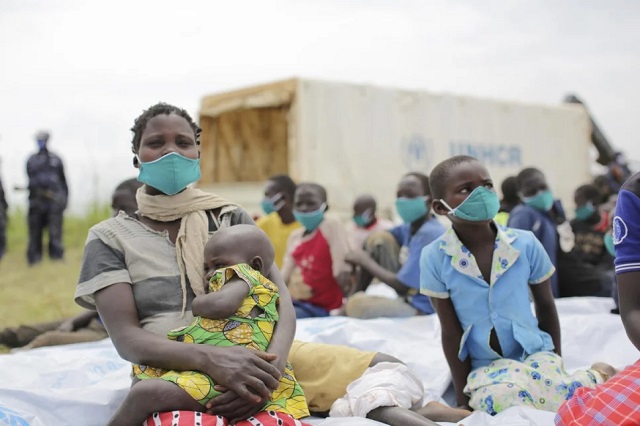
Kampala, Uganda | RONALD MUSOKE | The World Health Organization (WHO) has called for greater access to COVID-19 detection, testing and care among vulnerable populations grappling with the impacts of protracted conflict and humanitarian emergencies across Africa.
Speaking during a virtual press conference organized by the World Health Organization and the World Economic Forum on July 16, Dr. Matshidiso Moeti, the WHO regional director for Africa said COVID-19 has exacerbated existing humanitarian challenges, particularly with regards to access to health services in many countries in the region.
Dr. Moeti who was speaking alongside Dr. Pierre Somse, the Minister of Health and Population for the Central African Republic, Patrick Youssef, the International Committee of the Red Cross (ICRC)’s regional director for Africa, and Adhieu Achuil Dhieu Kueth, a South Sudanese refugee living in the Kenyan refugee camp of Dadaab noted that for at least three months now, vulnerable communities have been experiencing socio-economic difficulties exacerbated by COVID-19.
“With the pandemic we have seen some humanitarian operations delayed due to lockdowns, curfews and the restrictions of movement for both personnel and cargo vital for COVID-19 response,” she said, “Already funding shortages have resulted in reduced food rations in some settlements and imminent threats of increases in acute malnutrition, stunting and anaemia.”
“WHO urges the humanitarian community and member states to increase support to the millions of people in dire need of assistance in the region. If we don’t step up health services, including testing, tracing, isolation and care for people already living in precarious settings and displacement camps, COVID-19 could spark untold tragedy,” said Dr Moeti.
She said WHO is working with the United Nations Office for the Coordination of Humanitarian Affairs, the UN Refugee Agency (UNHCR) and other operational partners to raise awareness about COVID-19 among vulnerable populations, distribute medical supplies and implement preventive measures such as handwashing stations.
Efforts are also underway to strengthen surveillance, train health workers, establish tele-health centres, and test and care for people who contract the disease, she said.
Dr. Moeti added that WHO has developed guidance on adapting COVID-19 mitigation in camp or camp-like settings, recommending health screenings for people arriving at collective sites and temporary isolation centres for suspected cases.
Sub-Saharan Africa hosts more than 26% of the world’s refugees and around 19 million internally displaced people who have fled their homes due to violence and conflict. During this global crisis, these are among the most vulnerable people in the world to the COVID-19 pandemic.
Although information on COVID-19 transmission in humanitarian settings remains limited so far, about 1,800 COVID-19 cases have been reported in seven of these countries among the displaced, refugees, migrants or in areas affected by humanitarian crises.
Dr. Moeti said given the challenges in accessing humanitarian settings, cases of COVID-19 are possibly underreported and public health capacities for surveillance, testing, isolation, care and contact tracing, are being scaled-up wherever it’s possible.
In Burkina Faso, for instance, 110 health facilities have been closed due to insecurity while services have been run down in 186 others, leaving around 1.5 million people without adequate health care.
In Mali’s central and northern regions, health services have been paralyzed by persistent attacks. In 2019 alone, 18 attacks on health facilities were reported. So far this year, one health centre has been attacked.
In Ethiopia, community engagement, including in surveillance and infection prevention and control activities, is ongoing in all refugee camps and sites where internally displaced people are living.
However, in the Democratic Republic of the Congo, in complex settings in North and South Kivu and Ituri provinces, laboratories have been equipped to diagnose COVID-19, building on capacities strengthened during the Ebola response.
Dr. Moeti said the United Nations has activated health clusters in eight countries where the humanitarian situation requires support from the international community, including Burkina Faso, Central African Republic, Chad, Democratic Republic of the Congo, Ethiopia, Mali, Niger and South Sudan.
As of July 16, the African continent had registered over 645,591 COVID-19 cases, 14,067people deaths and 335,831 recoveries according to the Africa Centre for Disease Control and Prevention.
“We are seeing many governments ease lockdown measures that had been put in place and bought some time in scaling-up the public health capacities so we should be expecting that in some countries there will be an increase in cases,” Dr Moeti said, “We will all have to work together to then control what happens as far as those increases are concerned.”
 The Independent Uganda: You get the Truth we Pay the Price
The Independent Uganda: You get the Truth we Pay the Price





